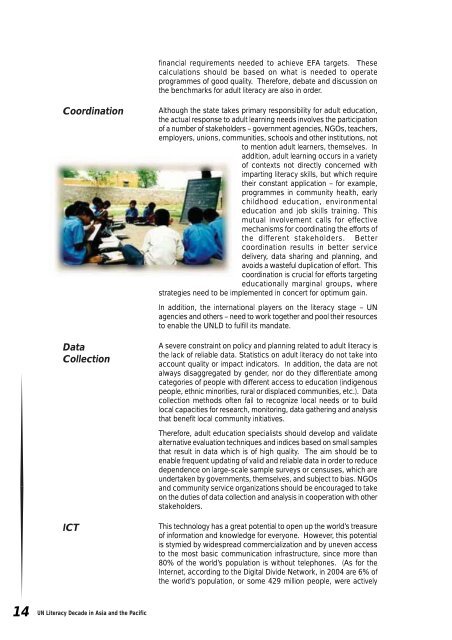The United Nations literacy decade in Asia and the Pacific Progress ...
The United Nations literacy decade in Asia and the Pacific Progress ...
The United Nations literacy decade in Asia and the Pacific Progress ...
Create successful ePaper yourself
Turn your PDF publications into a flip-book with our unique Google optimized e-Paper software.
f<strong>in</strong>ancial requirements needed to achieve EFA targets. <strong>The</strong>se<br />
calculations should be based on what is needed to operate<br />
programmes of good quality. <strong>The</strong>refore, debate <strong>and</strong> discussion on<br />
<strong>the</strong> benchmarks for adult <strong>literacy</strong> are also <strong>in</strong> order.<br />
Coord<strong>in</strong>ation<br />
Data<br />
Collection<br />
ICT<br />
Although <strong>the</strong> state takes primary responsibility for adult education,<br />
<strong>the</strong> actual response to adult learn<strong>in</strong>g needs <strong>in</strong>volves <strong>the</strong> participation<br />
of a number of stakeholders – government agencies, NGOs, teachers,<br />
employers, unions, communities, schools <strong>and</strong> o<strong>the</strong>r <strong>in</strong>stitutions, not<br />
to mention adult learners, <strong>the</strong>mselves. In<br />
addition, adult learn<strong>in</strong>g occurs <strong>in</strong> a variety<br />
of contexts not directly concerned with<br />
impart<strong>in</strong>g <strong>literacy</strong> skills, but which require<br />
<strong>the</strong>ir constant application – for example,<br />
programmes <strong>in</strong> community health, early<br />
childhood education, environmental<br />
education <strong>and</strong> job skills tra<strong>in</strong><strong>in</strong>g. This<br />
mutual <strong>in</strong>volvement calls for effective<br />
mechanisms for coord<strong>in</strong>at<strong>in</strong>g <strong>the</strong> efforts of<br />
<strong>the</strong> different stakeholders. Better<br />
coord<strong>in</strong>ation results <strong>in</strong> better service<br />
delivery, data shar<strong>in</strong>g <strong>and</strong> plann<strong>in</strong>g, <strong>and</strong><br />
avoids a wasteful duplication of effort. This<br />
coord<strong>in</strong>ation is crucial for efforts target<strong>in</strong>g<br />
educationally marg<strong>in</strong>al groups, where<br />
strategies need to be implemented <strong>in</strong> concert for optimum ga<strong>in</strong>.<br />
In addition, <strong>the</strong> <strong>in</strong>ternational players on <strong>the</strong> <strong>literacy</strong> stage – UN<br />
agencies <strong>and</strong> o<strong>the</strong>rs – need to work toge<strong>the</strong>r <strong>and</strong> pool <strong>the</strong>ir resources<br />
to enable <strong>the</strong> UNLD to fulfill its m<strong>and</strong>ate.<br />
A severe constra<strong>in</strong>t on policy <strong>and</strong> plann<strong>in</strong>g related to adult <strong>literacy</strong> is<br />
<strong>the</strong> lack of reliable data. Statistics on adult <strong>literacy</strong> do not take <strong>in</strong>to<br />
account quality or impact <strong>in</strong>dicators. In addition, <strong>the</strong> data are not<br />
always disaggregated by gender, nor do <strong>the</strong>y differentiate among<br />
categories of people with different access to education (<strong>in</strong>digenous<br />
people, ethnic m<strong>in</strong>orities, rural or displaced communities, etc.). Data<br />
collection methods often fail to recognize local needs or to build<br />
local capacities for research, monitor<strong>in</strong>g, data ga<strong>the</strong>r<strong>in</strong>g <strong>and</strong> analysis<br />
that benefit local community <strong>in</strong>itiatives.<br />
<strong>The</strong>refore, adult education specialists should develop <strong>and</strong> validate<br />
alternative evaluation techniques <strong>and</strong> <strong>in</strong>dices based on small samples<br />
that result <strong>in</strong> data which is of high quality. <strong>The</strong> aim should be to<br />
enable frequent updat<strong>in</strong>g of valid <strong>and</strong> reliable data <strong>in</strong> order to reduce<br />
dependence on large-scale sample surveys or censuses, which are<br />
undertaken by governments, <strong>the</strong>mselves, <strong>and</strong> subject to bias. NGOs<br />
<strong>and</strong> community service organizations should be encouraged to take<br />
on <strong>the</strong> duties of data collection <strong>and</strong> analysis <strong>in</strong> cooperation with o<strong>the</strong>r<br />
stakeholders.<br />
This technology has a great potential to open up <strong>the</strong> world’s treasure<br />
of <strong>in</strong>formation <strong>and</strong> knowledge for everyone. However, this potential<br />
is stymied by widespread commercialization <strong>and</strong> by uneven access<br />
to <strong>the</strong> most basic communication <strong>in</strong>frastructure, s<strong>in</strong>ce more than<br />
80% of <strong>the</strong> world’s population is without telephones. (As for <strong>the</strong><br />
Internet, accord<strong>in</strong>g to <strong>the</strong> Digital Divide Network, <strong>in</strong> 2004 are 6% of<br />
<strong>the</strong> world’s population, or some 429 million people, were actively<br />
14<br />
UN Literacy Decade <strong>in</strong> <strong>Asia</strong> <strong>and</strong> <strong>the</strong> <strong>Pacific</strong>

















